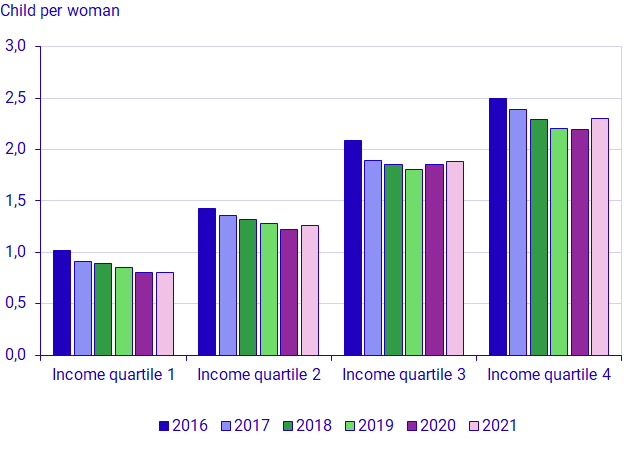Is Sweden “Eugenic”?
Statistics Sweden has released fertility data for 2021 broken down by women’s country of birth, type of community, employment status, and income. A remarkable finding is that, among native-born Swedes, the richest 25% have massively more children children on average (2.3) than the poorest 25% (0.8). An almost three-fold difference!
Previous research has also shown that wealthier Swedes born 1940-1970 have had more children, but I have not seen such a stark difference before.
This data is significant because it goes against a widely-perceived trend of the less educated and less socioeconomically successful having more children in modern states.
In premodern times, there is significant evidence of more educated Englishmen, Chinese, and Ashkenazi Jews having more children on average. E.g., see Gregory Clark’s The Son Also Rises for historical data on class and fertility in England, China, and Sweden. This trend likely would have led to increase in the prevalence of genes favoring studiousness and professional success (e.g., intelligence, self-discipline, ability to defer gratification, sociability).
By contrast, the conditions of modern life have led to (more educated?) people reducing their fertility while eliminating many of the pressures of natural selection. This worried Charles Darwin himself, who wrote in The Descent of Man (1871):
With savages, the weak in body or mind are soon eliminated; and those that survive commonly exhibit a vigorous state of health. We civilized men, on the other hand, do our utmost to check the process of elimination; we build asylums for the imbecile, the maimed, and the sick; we institute poor laws; and our medical men exert their utmost skill to save the life of everyone to the last moment … No one who has attended to the breeding of domestic animals will doubt that this must be highly injurious to the race of man.
More recently, in the 1980s, Singapore Prime Minister Lee Kuan Yew was greatly alarmed at the least educated women in his country having around twice as many children as the most educated. The professionalization and higher education of women in postcolonial Singapore coincided with a sharp fertility drop. Indeed, Lee dedicated his entire 1983 National Day speech to this topic and launched a largely unsuccessful “eugenics” campaign to boost childbearing among Singapore’s educated women.
Dysgenic fears about the more intelligent reproducing less leading to an idiotic dystopia were also parodied in the 2006 Mike Judge film Idiocracy.
It would be interesting to know how fertility and socioeconomic category trends have since developed in Singapore. In postwar Japan, the wealthier and more educated have had more children than the poor and uneducated, although not as starkly as in Sweden today.
Statistics Sweden’s data also shows a slight increase in the fertility rate of native-born women in 2021 after a period of continuous decline. The fertility of foreign-born women continued to decline.



Seb Jensen did a meta-analysis of international rates of dysgenics. Sweden is not eugenic, but it's only weakly dysgenic. https://www.cspicenter.com/p/are-we-getting-dumber
It would be interesting to see the same numbers for France. The policy of having double deductions on income tax for the 3rd child is only of benefit to the 50% of the couples that pay tax. The higher one's tax rate, the larger the incentive